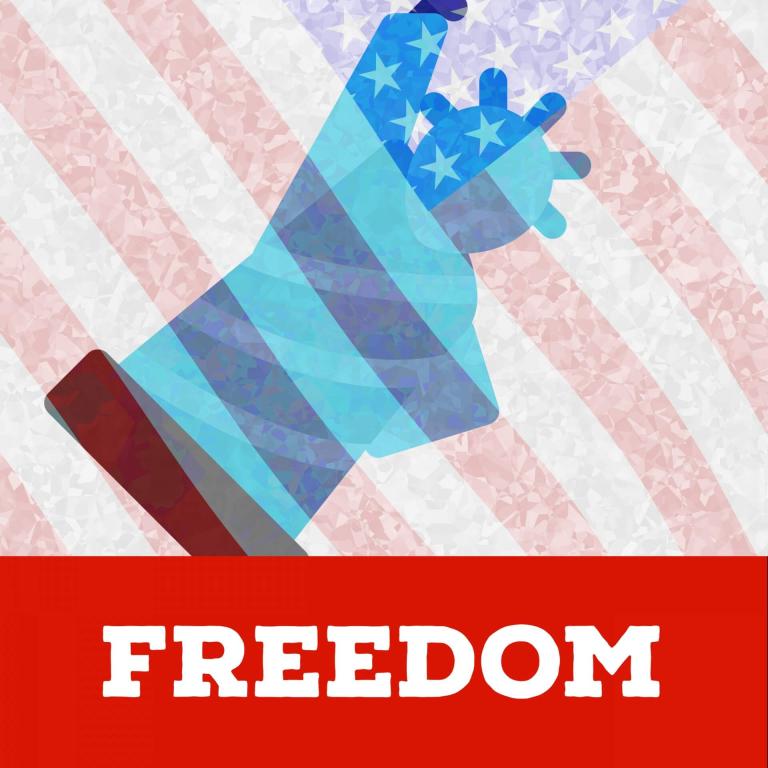Here the 10 tenets of Freedom Conservatism:
- Liberty. Among Americans’ most fundamental rights is the right to be free from the restrictions of arbitrary force: a right that, in turn, derives from the inseparability of free will from what it means to be human. Liberty is indivisible, and political freedom cannot long exist without economic freedom.
- The pursuit of happiness. Most individuals are happiest in loving families, and within stable and prosperous communities in which parents are free to engage in meaningful work, and to raise and educate their children according to their values.
- The foundation of prosperity. The free enterprise system is the foundation of prosperity. Americans can only prosper in an economy in which they can afford the basics of everyday life: food, shelter, health care, and energy. A corrosive combination of government intervention and private cronyism is making these basics unaffordable to many Americans. We commit to reducing the cost of living through competitive markets, greater individual choice, and free trade with free people, while upholding the rule of law, freedom of contract, and freedom of association.
- Full faith and credit. The skyrocketing federal debt—which now exceeds the annual economic output of the United States—is an existential threat to the future prosperity, liberty, and happiness of Americans. We commit to building a constructive reform agenda that can restore America’s fiscal sustainability, ensuring that future generations inherit a more prosperous and secure nation than the one we now inhabit.
- A nation of laws, not men. Equality under the law is a foundational principle of American liberty. Unfortunately, today this principle is under attack from those who believe that the rule of law does not apply to them. One manifestation of this problem is the explosion of unaccountable and unelected regulators who routinely exceed their statutory authority and abridge Americans’ constitutional rights. The President should only nominate policymakers and judges who are committed to upholding these rights.
- Americans by choice. Immigration is a principal driver of American prosperity and achievement. America is exceptional because anyone—from any corner of the earth—can seek to live in America and become an American. Nearly all American citizens descend from someone who came here from somewhere else, and we must treat all citizens equally under the law. To this end, the United States, as a sovereign nation, has the right to secure its borders and design a rational immigration policy—built on the rule of law—that advances the interests and values of American citizens.
- Out of many, one. The best way to unify a large and diverse nation like the United States is to transfer as many public policy choices as possible to families and communities. Much of the discord in America today comes from the fact that too many decisions are made for us by centralized authorities. The Constitution of the United States is the best arrangement yet devised for granting government the just authority to fulfill its proper role, while restraining it from the concentration and abuse of power.
- America’s promissory note. Martin Luther King, Jr. described the Constitution and the Declaration of Independence as containing “magnificent words…a promissory note to which every American was to fall heir.” Prior to 1964, however, slavery and segregation were enforced by state governments and, in many cases, by the federal government. Many who descend from victims of this system now face economic and personal hurdles that are the direct result of this legacy. We commit to expanding opportunity for those who face challenges due to past government restrictions on individual and economic freedom. We adamantly oppose racial discrimination in all its forms, either against or for any person or group of people.
- The shining city on a hill. American foreign policy must be judged by one criterion above all: its service to the just interests of the United States. Americans are safest and freest in a peaceful world, led by the United States, in which other nations uphold individual liberty and the sovereignty of their neighbors.
- Freedom of conscience. Essential to a free society is the freedom to say and think what one believes to be true. Under the First and Fourteenth Amendments to the Constitution, federal and state governments have a legal obligation to uphold and protect these freedoms. Private institutions have a moral obligation to do the same.
Compare these 10 convictions to the 10 convictions of National Conservatism, which you can find
here, more fully developed at the movement’s
website.
This is, of course, a debate between what I have called “small government conservatives,” who want to limit government and maximize individual liberty and “big government conservatives,” who want to use government power for conservative social ends.
You will note that the Freedom Conservatism document says nothing explicitly about God and religion, though the signatories include a number of religious leaders. Whereas the National Conservatism document says much about God and religion, though, as we have discussed at this blog, much of that is theologically problematic. (See
this and
this.)
Shaffer makes the point that the Republican presidential candidates are pretty much ignoring the debate. But while they are certainly ignoring the theoretical debate that is roiling the conservative movement and claiming the label “conservative” without explaining what kind of conservative they are, you can certainly tell the difference in the policies they are recommending.
National Conservatism grew out of the Donald Trump phenomenon, an effort by conservative intellectuals to turn the “Make America Great Again” slogan and its related policy proposals into a coherent ideology. So Trump exemplifies National Conservatism, as does Ron DeSantis, who hopes to use government power to shut down the “woke agenda” in schools, businesses, and government.
Thus, Chris Christie, as a Freedom Conservative, is able to to claim that DeSantis, with his initiatives against big corporations like Disney, is “not a conservative.” He is, but not Christie’s kind of conservatism.
As for the other candidates. . . .Well, you tell me. I don’t know if any of them advocate free trade, traditionally a shibboleth for free market conservatives, given the hostility to China. Some, such as Nikki Haley, are arguably yet another kind of conservative: The “neo-conservatives” who promote aggressive military action to spread democracy.
Where do you think Tim Scott, Vivek Ramaswamy, and other Republican candidates would fit in with these ideologies?
More importantly, perhaps, if you are a conservative, what kind of conservative are you?
I myself have Free Conservative instincts, but I recognize that some of our cultural problems are so enormous and so consequential–such as life issues–that a laissez faire approach will not resolve them (indeed is responsible for them), giving me some sympathy for the National Conservatives. And yet I fear authoritarianism.
Help me out as I try to think through all of this!
Illustration by Linnaea Mallette, CC0, Public Domain via PublicDomainPictures.net














